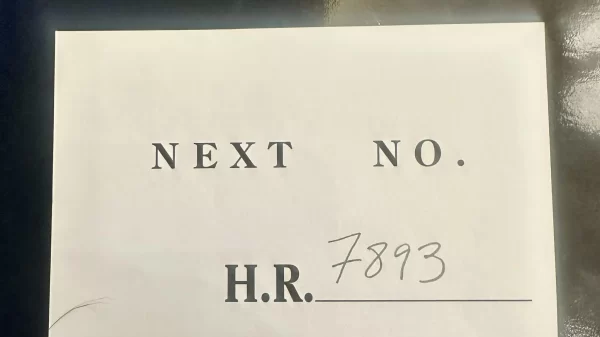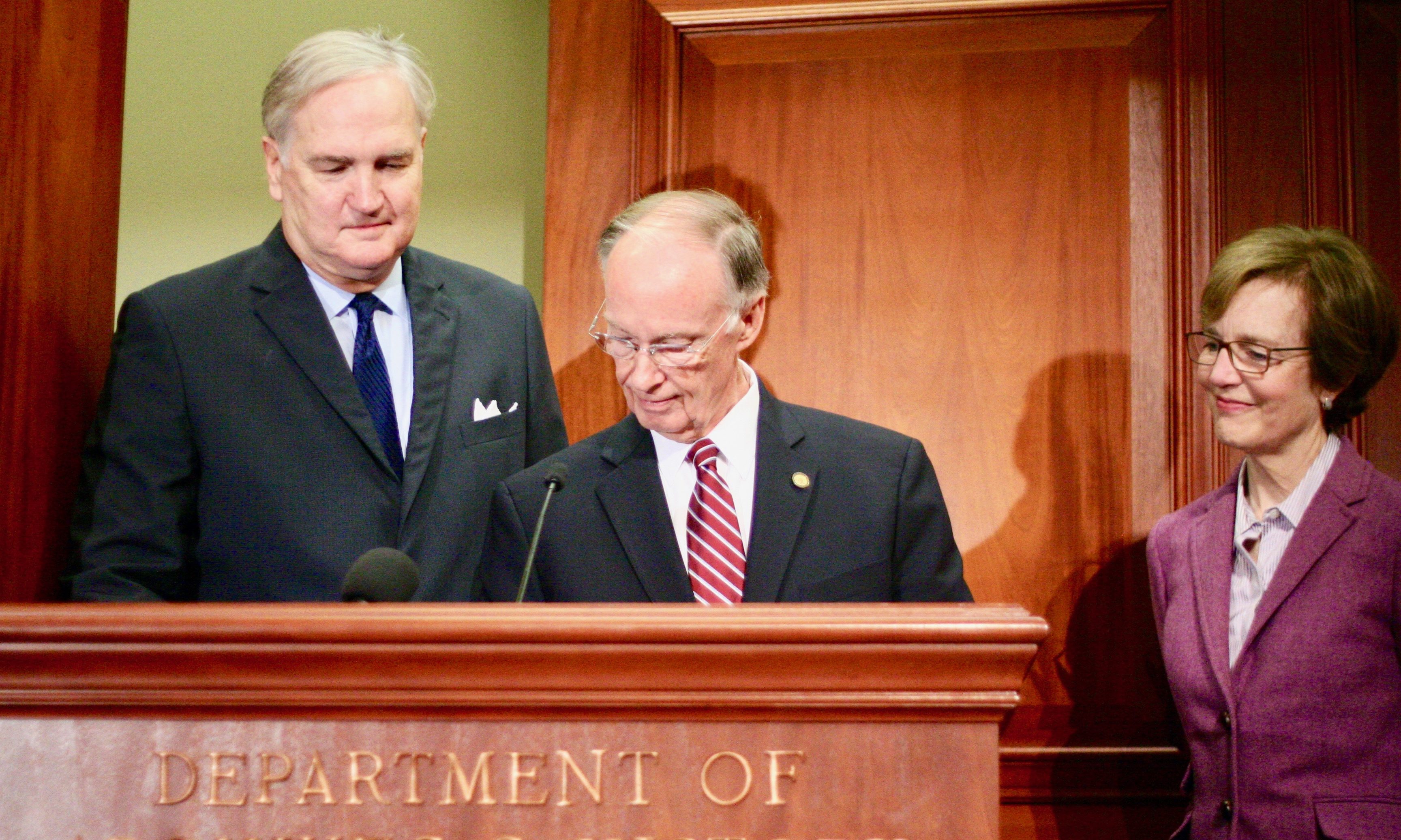By Josh Moon
Alabama Political Reporter
On Thursday, yet another ethics complaint was filed against Luther Strange, Alabama’s appointed U.S. Senator.
It is the latest in what has become a recurring problem for Strange – people, from his opponents to the Alabama Secretary of State to just ordinary citizens, raising legal questions about his behavior.
Thursday’s ethics complaint, filed by Tuscaloosa businessman Stan Pate, accuses Strange of three violations of ethics laws for accepting an appointment to the Senate from a person Strange was investigating. Strange, the state’s former attorney general, was in the midst of an active investigation focused on former Gov. Robert Bentley.
Pate’s ethics complaint claims Strange violated ethics laws by announcing his desire to be appointed to the Senate, by accepting an interview with Bentley for the position and by accepting the appointment in exchange for stalling the investigation into Bentley.
“Common sense is that a deal was agreed upon by then-Governor Bentley and then-Attorney General Strange — an unethical and illegal act by the two parties,” the complaint reads. “Luther Strange violated the public trust and the sworn duties of the Office of the Attorney General of the State of Alabama.”
Strange has denied that a quid-pro-quo agreement existed with Bentley.
While Pate and others clearly have axes to grind with Strange, the number of questions raised about Strange’s alleged unethical behavior is staggering, particularly when you consider he’s not even the frontrunner in the special election race for the Senate seat.
Consider these:
- A complaint was filed with the Alabama Bar Association accusing Strange of misusing his office by accepting the Senate appointment from Bentley.
- An ethics complaint was filed by Secretary of State John Merrill accusing Strange of two campaign finance violations – violations similar to the ones that led to Bentley’s resignation and arrest.
- An ethics complaint was filed by a group of citizens alleging Strange misused his office for personal gain by accepting donations from a coal company in exchange for stifling an EPA superfund.
- Letters from the Project on Government Oversight have asked U.S. AG Jeff Sessions to recuse from the ongoing federal investigation of bribery related to the EPA superfund and cited Strange’s behavior, and, in part, Sessions’ relationship with Strange for the recusal.
- A state representative accused Strange of being part of a meeting in which the representative was offered a bribe for working against the EPA – an allegation the representative later recanted. But law enforcement sources have confirmed to APR that those allegations are being investigated, along with allegations from a second state representative who was also approached.
All of these have come in the past few months, and they have helped push an image of Strange as an opportunist who will disregard ethics in exchange for personal gain. Those views, in large part, help explain how a man who was very popular among Republican voters two years ago – at the height of his office’s investigation of former House Speaker Mike Hubbard – is now trailing by nearly double digits to a polarizing and controversial candidate like Roy Moore.
“People don’t think Roy Moore is a crook,” said a state pollster, who asked to remain anonymous. “They’re not so sure about Strange. He has made a lot of bad decisions over the last year.”
That is a huge understatement.
Strange could have easily won Sessions’ Senate seat had he merely declined the appointment from Bentley – as he originally said he would – and waited on either a special election or the 2018 midterms.
Instead, believing that he could weather any initial blowback and rely on Bentley to not call a special election, giving voters time to forget his decision, Strange couldn’t bear to watch someone else achieve the seat. And that decision to accept the appointment from Bentley reignited the interest in impeaching the governor and led to public outrage.
Strange didn’t help matters by proclaiming at his appointment press conference that his office had never said that Bentley was under investigation and that media reports saying Bentley was under investigation was “unfair” to Bentley.
A week later, appointed AG Steve Marshall confirmed that Bentley was under investigation and the level of deception in Strange’s comments became apparent. Recently, Strange’s former chief deputy, Alice Martin, told APR that Bentley was “the target” of the investigation that she was leading and she wasn’t sure why Strange said what he did.
Whatever his reasoning, the decision to accept the appointment and then lie when asked about the investigation transformed Strange from a shoo-in for Sessions’ seat to a pariah.
Recent polls, even after a public endorsement from the president – a rarity in primary races – still had him trailing Roy Moore by around 8 points.
Life in the Swamp
That’s likely because Strange’s history in politics makes it very hard for him to convince voters that he’s not an opportunist and a career politician who would do most anything to stay in the game.
As “swamp draining” has become popular, Strange has attempted to latch onto that message, promising to support Trump’s alleged efforts to “drain the swamp.” If anything, Trump’s support for Strange has been indicative of just how phony that effort is.
Before landing in the Alabama AG’s office, Strange was a DC lobbyist and worked for energy companies. Strange is no outsider. He is the swamp.
As AG, Strange rarely sided with working Alabama citizens in fights over greed and corruption, choosing instead to side with coal companies against suffering victims in north Birmingham and to shutter electronic bingo casinos in the state’s poorest counties.
Campaign finance records first reported by APR show that Strange accepted at least $75,000 in campaign contributions from Drummond Coal, which had been labeled as a potentially responsible party for pollution in north Birmingham. The final two $25,000 “donations” from Drummond to Strange were sent within days of Strange writing letters to the EPA informing the agency that Alabama would not support the superfund designation of the 35th Avenue pollution site.
That site is so contaminated that the tops of nearly 300 yards in surrounding neighborhoods have been removed because of soil pollution that has sickened people. Cleanup costs for the current project will run an estimated $20 million, but sources familiar with the EPA’s investigation say that companies in the area, including Drummond, are desperate to kill testing before it stretches to other sites.
Strange’s intrusion into the investigation – an intrusion that was not requested by the Alabama Department of Environmental Management (ADEM), which was tasked by the governor to coordinate with the EPA – could do just that. The EPA needs states’ agreement and cooperation to place a superfund site on a national priority list, which devotes more money and resources to cleaning up the pollution.
Stifling the EPA has been a focus of Drummond and other conspirators, according to a plea agreement filed in June against former Rep. Oliver Robinson. In that agreement, Robinson admits to accepting a bribe and is working with federal law enforcement to name names of others involved, including at least one Drummond executive and an attorney from the powerful Balch and Bingham Law Firm.
Both Drummond and Balch and Bingham have deep ties to Strange and Sessions, and each have contributed thousands to both men. So deep, in fact, that the Project on Government Oversight in D.C. wrote to Sessions and Jay Town, the newly-appointed U.S. Attorney for the Northern District of Alabama, and asked that they recuse themselves from any involvement in the ongoing federal and state investigations.
Questionable Donations
Those donations aren’t the only ones associated with Strange’s Senate campaign that have drawn attention.
Strange has also been the darling of the Republican establishment in this election and received millions in donations from establishment sources and received millions more in ad buys from the Senate Leadership Fund PAC, which is controlled by Senate Majority Leader Mitch McConnell. That PAC has received money over the last month primarily from the same two men – billionaire hedge fund manager Steve Cohen and billionaire casino owner Phil Ruffin.
(Ruffin isn’t the only casino owner whose money has found its way to help Strange, who has raked in hundreds of thousands from Ruffin, Sands Casino owner Sheldon Adelson and the Poarch Creek Indians. Most of that money was first sent through a PAC to make it easy for Strange, who famously raided Alabama casinos as AG, to distance himself from the original sources and avoid accusations of a quid pro quo.)
In addition to those donations, Strange has also taken in thousands from the usual corporate players – Goldman Sachs donated $2,500 last month, U.S. Steel gave $5,000, various energy and oil companies dumped in hundreds of thousands and financial entities dumped in thousands more.
Mr. Corruption
Because of those donations and the various other problems, Strange has, of course, become the target of pointed criticism from his opponents in the Senate primary. Rep. Mo Brooks, Moore and Randy Brinson have pulled few punches.
Strange, who has never polled higher than second in any Republican primary poll conducted, including the internal polls conducted by the campaigns, has been criticized far more than any of the other candidates, including frontrunner Moore. That’s despite Moore being twice removed as the Chief Justice of Alabama’s Supreme Court.
At a June press conference, Brinson, the former head of Alabama’s Christian Coalition, called Strange “Mr. Corruption” and said he also had been told by Rep. John Rogers that Strange had been present when Drummond and Balch and Bingham officials had offered Rogers a bribe.
Brinson was also critical of the Alabama Ethics Commission, which this month delayed a meeting – at which it was rumored to be taking up Merrill’s complaint against Strange – until a day after the primary election.
“From his shady appointment to his shady contributions and campaign finance violations similar to what Gov. Bentley was convicted of, (Strange) has been Mr. Corruption,” Brinson said. “Alabama voters deserve better.”














































